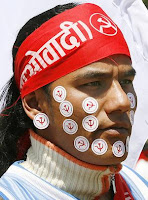Consumption aspirations and their political implications
 The complete sweep by Maoists in the Nepalese elections has left everyone around the world stunned. Prachanda, leader of the Maoists, inspired by China's Cultural Revolution and the theories of Mao Zedong aspires to be Nepal's first president. Its interesting to note that Prachanda is inspired by Mao, who is described by his detractors as a butcher responsible for death of millions in his country. Prachanda on his part, of late, has tempered both his ideology and rhetoric.
The complete sweep by Maoists in the Nepalese elections has left everyone around the world stunned. Prachanda, leader of the Maoists, inspired by China's Cultural Revolution and the theories of Mao Zedong aspires to be Nepal's first president. Its interesting to note that Prachanda is inspired by Mao, who is described by his detractors as a butcher responsible for death of millions in his country. Prachanda on his part, of late, has tempered both his ideology and rhetoric.The larger question is, how can a country vote into power a party whose ideology is steeped in violence and intimidation? The may answer to that may not be a simple one.
Yet, one thing is for sure. People through the power of their vote are trying to usher in change. They expect the ones voted into power to change their lives for the better. In fact, I am willing to bet that the ideology doesn't matter. Ask voters around the world, what the ideology of the party they voted for is, my guess is, not many know. To the voter, it doesn't matter. What matters is his wish for change, to his own life, betterment to his living conditions.
What does this betterment actually mean? The 'betterment' translates into better access to products and services at affordable prices. Ideology be damned. What matters is the fulfillment of 'aspirations'. Aspirations that the masses hold, as consumers. If an incumbent wants to voted back into power, all he should have done during his tenure, is to satiate the polity's desire to consume with the disposable incomes they possess. If that is achieved, a return to political power is a sure fire guarantee. Which is why the present UPA government in India is on an overdrive to curtail spiralling inflation. If they can't, the political costs are going to be heavy, never mind the global spurt in inflation.
Don't be surprised at the victory of the Maoists. Its an exhibition of the Nepalese voter's desire for change. A change to their lives. A change that can usher in an era of fulfillment of the polity's consumption aspiration. The Maoists should be wise enough to dump ideology and embrace whatever it is that can fulfill those aspirations. Else they are on their way out, come next round of elections.
Pic : http://www.smh.com.au
Comments